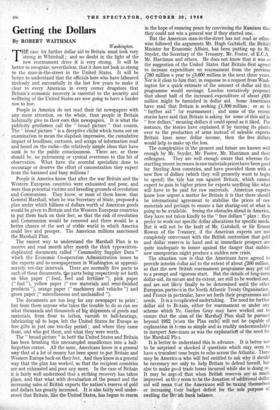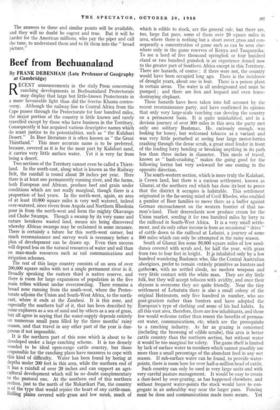Getting the Dollars
By ROBERT WAITHMAN Washington.
THE case for further dollar aid to Britain must look very -"Strong in Whitehall ; and no doubt in the light of the new rearmament drive it is very strong. It will be better to recognise, nevertheless, that it does not look as strong to the man-in-the-street in the United States. It will be better to understand that the officials here who have laboured tirelessly and successfully in the last few years to make it clear to every American in every corner drugstore that Britain's economic recovery is essential to the security and wellbeing of the United States are now going to have a harder row to hoe.
People in America do not read their fat newspapers with any more attention, on the whole, than people in Britain habitually give to their own thin newspaperg. It is what the publicity gentlemen call the " broad picture " that counts. The " broad picture P is a deceptive cliché which turns out on examination to mean the slapdash impression, the cumulative impact of headlines, cartoons, and scraps of information read and heard on the radio—the relatively simple ideas that have sunk in to the public consciousness. There are, or there should be, no patronising or cynical overtones to this bit of observation. What have the scornful specialists done to encourage or deserve the effort of concentration they expect from the harassed and busy millions ?
People in America know that after the war Britain and the Western European countries were exhausted and ,poor, and were thus potential victims and breeding grounds of revolution and Communism. They know, or most of them know, that General' Marshall, when he was Secretary of State, proposed a plan under which billions of dollars worth of American goods would be given to Britain and the Western European countries to put them back on their feet, so that the risk of revolution and Communism would be removed and there would be a better chance of the sort of stable world in which America could live and prosper. The American millions sanctioned the Marshall Plan.
The easiest way to understand the Marshall Plan is to receive and read month after month the thick typewritten- duplicated documents called " Commodity Supplier Data " which the Economic Co-operation Administration issues to the experts and to newspapermen in Washington at approxil mately ten-day intervals. There are normally five parts to each of these documents, Vie parts being respectively set forth on blue paper (" food, reed and fertiliser '), pink paper (" fuel "), yellow paper (" raw materials and semi-finished products "), orange paper (" machinery and vehicles ") and green paper (" miscellaneous and unclassified ").
The documents are too long for any newspaper to print ; but from them anyone who'takes the trouble to do so can see what thousands and thousands of big shipnients of goods and materials, from flour to lathes, varnish to ball-bearings, lubricating oil to hops, left the United States for Europe as free gifts in just one ten-day period ; and where they came from, and who got them, and what they were worth.
The " broad picture " in botH the United States and Britain has been brushing this unexampled munificence into a half- forgotten corner. All the same, Americans know in a general way that of a lot of money has been spent to put Britain and Western Europe back on their feet. And they know in a general way that the plan has worked, so that the recipient countries are not exhausted and poor any more. In the case of Britain it is fairly well understood that a striking recovery has taken place, and that what with devaluation of the pound and the increasing sales of British exports the nation's reserve of gold and dollars has greatly increased. It is also fairly well under- stood that Britain, like the United States, has begun to rearm in the hope of ensuring peace by convincing the Russians that they could not win a general war if they started one.
But the American man-iri-the-street has not read or other- wise followed the-arguments Mr. Hugh Gaitskell, the British Minister for Economic Affairs, has been putting up .to Mr. Snyder, ,the Secretary of the Treasury, Mr. Foster, of E.C.A., Mr. Harriman and others. He does not kriow that it was at the suggestion of the United States that Britain first agreed to increase expenditure on rearmament from the previous £780 million a year to 0,660 million in the next three years. Nor is it clear to him that, in response to a request from Wash- ington for a, quick estimate of the amount of dollar aid this programme would envisage, London tentatively proposed that about half of the increased expenditure of about £630 million might be furnished in dollar aid. Some Americans have read that Britain is seeking £1,500 million ; or so in " further aid " for rearmament ; and some of the recent stories have said that Britain is asking for some of this aid in " free dollars," meaning dollars it could spend as it liked. For -instance, the 'stories have explained, if by turning its plants over to the production of arms instead of saleable exports Britain loses some dollar income, then the free dollars would help to make up the, loss. The complexities in 'the present and future are known well enough by Mr. Snyder, Mr. Foster, Mr. Harriman and their colleagues. They are well enough aware that whereas the startling recent increases in raw materials prices have been good for Sterling Area countries, and have provided them with a new flow of dollars (which they will presently want to begin to spend) the tide has run against Britain, which cannot expect to gain in higher prices for exports anything like what will have to be paid for raw materials. American experts know how urgent a matter for Britain it is that there should be international agreement to stabilise the prices of raw materials and perhaps to ensure a fair sharing-out of what is, going to be available. Seeing the obstacles ahead in America, they have not taken kindly to the " free dollars " plan : they prefer to work out specific dollar allocations for specific needs. But it will not be the fault of Mr. Gaitskell, or Sir Ernest Rowan of the Treasury, if the American experts are not completely conversant with the British contention that gold and dollar reserves in hand and in immediate prospect are quite inadequate to insure against the danger that sudden new emergencies might produce a sudden new crisis.
The situation now is that the Americans have agreed to provide interim dollar aid to the extent of about £200 million, so that .the new British rearmament programme may get off to a prompt and vigorous start. But the details of long-term dollar-aid, its, nature and its-extent, are still to be worked out, and are not likely finally to be determined until the other European_partners in the North Atlantic Treaty Organisation, and France in particular; have set forth their programmes and needs. It is a complicated undertaking. The need for further dollar aid to Britain, either for rearmament or under any scheme which Mr. Gordon Gray may have worked out to ensure that the aims of the Marshall Plan shall be pursued beyond 1952 (when 'the Plan ends) will not be capable of explanation in terms as simple and as readily understandabl e to inexpert Americans as was the explanatioff of the need for the Marshall Plan.
It is better to understand this in advance. It is better not to be surprised or shocked if questions which may seem to have a truculent tone begin to echo across the Atlantic. There may be Americans who will feel entitled to ask why it should be necessary not only to help Britain to defend herself, but also to make good trade losses incurred while she is doing so. It may be argued that when British reserves are as much improved as they seem to be the donation of additional dollar aid will mean that the Americans will be, taxing themselves or increasing their budget deficit for the sole purpose of swelling the British bank balance. The answers to these and similar points will be available, and they will no doubt be cogent and true. But it will be harder for the American millions, who pay the piper and call the tune, to understand them and to fit them into the " broad picture."



















 Previous page
Previous page